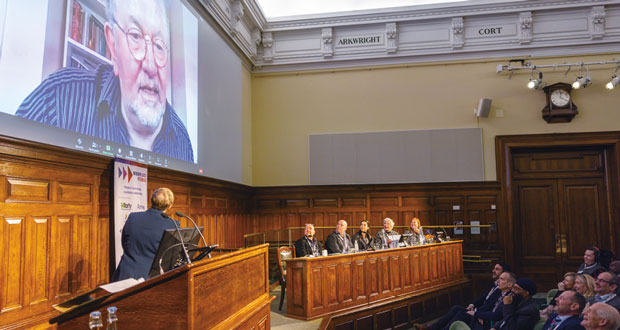Workplace Futures 2024 focused on the symbiotic relationship between people and technology, which for FMs means delivering a quality workplace experience
The meshing of the physical and digital worlds was a theme that ran through this year’s Workplace Futures conference. Simone Fenton-Jarvis took over as an able in person chair, with longstanding chair Martin Pickard joining online with a coterie of remote delegates for the Q&A sessions.
Katherine Harvey from Unwork began with a description of two new typologies; the rise of placemakers in the physical office and the widespread adoption of digital workplace experience apps. People want the chance to mix with their colleagues she explained – so ‘team huddle’ spaces are a popular way of enabling teams to connect, discuss and collaborate in immersive hybrid environments. The major trend of 2024 she concluded will be a push for a ‘return on experience’ that supports recruitment and retention.
Leanne Lynch from ISS, said she couldn’t think of a better industry than FM to explore the digital driven working environment, while remaining human centric. Using tech to gain an understanding of the rhythm of the building and the people who go there you’ll find better ways to operate the building and discover what drives people into the workplace.
Adding a note of caution, David Sharp, CEO, International Workplace questioned whether removing friction by automating our workplaces is really a good thing. Has the friction really been removed, or has it just been hidden from sight and who are the people we don’t see behind the technology?, he asked.
RECRUITMENT AND AI
Lara Al Ansari and Brad Taylor of AWA research into the use of AI for recruitment included some useful tips – with arguably the most pressing one being to engage with people now to educate them on the effects of AI, not least to reassure them that AI won’t replace them in the future.
Though recruitment and retention expert Tim Cook CEO, of nGAGE TALENT pointed out, “you won’t be replaced by AI but by someone who knows what it is.” The main problem in many organisations is corporate lag he explained, where the people running the companies have very little idea of what’s coming down the track and with the genie now out of the bottle, the impact of AI and algorithms can no longer be ignored he concluded.
We are sleepwalking into skills stagnation, warned Linda Hausmanis, CEO of the IWFM in an impassioned diatribe on the failure of so many employers to tap into the unused skills of their staff. She argued that no matter what technology is used, there is always a human being at the heart of service delivery which for the FM sector means having access to people with the right skills.
THE RIGHT EXPERIENCE
Facilities has seen a lot of brand changes over the past few years, and the latest incarnation is Experience Manager. David Howorth, Global Colleague Experience Lead at BP said there are a lot of doubters in our industry that see the experience side of FM as the fluffy stuff, but workplace experience makes good business sense. To achieve this, is as much about fostering a leadership culture as it is providing a first-class workplace environment. No matter the size of the organisation, there is a need for skilled ‘corporate experience’ professionals covering the three enablers, physical, colleague and digital.
Moving from the client FM to the provider’s view, Mark Hill of Sodexo described the challenge of moving beyond policy to one which values human interaction in a workplace setting. And it’s here where it is vital to foster cross organisational collaboration among the disciplines, encompassing, HR, DE&I, Real Estate and of course FM/ Workplace.
Providing the software expert’s perspective, Mats Broman, Marc Watkins, and Hazel Bedson of Service Works Global (SWG) noted that too often tech being used to streamline operations is just there to reduce costs. It would be better used to provide meaningful data that helps drive decision making processes. Valuable insights by people running facilities can’t be replaced overnight but it can give them more confidence in the data. It’s not about the tech but what you can achieve from it.
ENHANCING CONNECTIONS
Matt Chapman and Kelly Dolphin from SBFM, which won the annual i-FM Technology in FM Award for Optimise AI – a sophisticated computer program trained using SBFM data to help answer day to day questions from its 7,000 staff, posed the simple question, ‘how well do you know your staff?’ Using the tech to get the back story on front line workers often the hidden figures in FM is key, and they were keen to share this blueprint for ways to enhance human connection.
It’s not just humans but animals who benefit from the latest security tech at London Zoo said Kieran Mackie of Amulet Security and Kelly Wessell, Security and Resilience Manager, at ZSL. After installing CCTV to improve the security at the 27,000 sq ft site, they’re now using the equipment to help monitor animal welfare inside the enclosures and improve the visitor experience. A great example of tech that does so much more than make people safe.
As Lucy Jeynes concluded in her round up of the day and call to action – it’s the human part of the puzzle that makes the technology worth doing, by using the emerging technologies to enable us to become more human centric.





